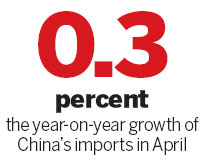Imports to get boost from tariff cuts, fiscal support

Adjustments to further promote balanced trade, says vice-premier
China will adjust trade tariffs and provide fiscal support to boost imports while the world economy is undergoing a "complicated" restructuring, Vice-Premier Hui Liangyu said on Thursday.
He said the adjustments aim to further promote balanced trade, but he did not provide details about how and when the tariffs would be changed.
Hui made the remarks at the opening speech to the Asia-Pacific Economic Cooperation China CEO Forum in Beijing.
Further enhancing opening-up to achieve mutual benefit is a firm basic principle of China, and the country objects to any form of trade protectionism, he said.
Hui also said that the government will encourage foreign investors to put money into green technology, environmental protection, financial services and technological research and development.
It will also try to create a better business and investment environment for foreign investors, he said.
"Meanwhile, we will continue to encourage and help domestic enterprises to invest overseas."
All these efforts are intended to better respond to the challenges of development, which are becoming thornier as the global economy is still struggling, he said.
"The world economy is undergoing complicated changes, and achieving a full recovery still has a long and tortuous way to go."
China's exports increased by 4.9 percent year-on-year in April, and imports edged up 0.3 percent.
Weak domestic demand pushed up the trade surplus to $18.42 billion, according to data released by the General Administration of Customs.
The purchasing managers' index, a reading of manufacturing activity, came in at 50.4 in May, 2.9 points below the previous reading of 53.3, surprising the market on the downside by a large margin. The sub-index of export orders fell 1.8 points to 50.4.
A recent survey by Reuters of 22 economic analysts showed that export and import growth rates are estimated to have risen only slightly in May, amid the spreading European debt crisis.
"China's trade sector could be affected further by rising global uncertainties.
"While the Ministry of Commerce said that both exports and imports performed extremely well (up by 25 percent year-on-year) in the first 10 days of May, we remain cautious on the trade outlook in the next few months as the eurozone, China's biggest trade partner, could fall into a steeper recession in the second quarter," said Liu Ligang, head of China economics at the Australia and New Zealand Banking Group Ltd.
China is faced with rising pressure from overseas, and "proactive" policies such as cutting tariffs to facilitate trade and spur imports are needed, said Wang Haifeng, director of international economics at the Institute for International Economic Research, which is affiliated to the National Development and Reform Commission.
"China's current tariff levels are still higher than those in developed economies, which means there is much room for cuts," Wang said.
To spur imports and promote economic restructuring, China announced last year that it will cut tariffs for more than 730 kinds of goods this year, including energy, skin care products, milk and other goods.
Closer cooperation between China and other APEC economies will help counter the many challenges to trade, as the bloc accounts for 40 percent of the world's population, 54 percent of its GDP, 53 percent of its trade, and has the most dynamic economies among its members, Hui said.
Trade officials from the 21 members of APEC said on Tuesday that they expected to reach a consensus by September on a list of environmentally friendly products that would receive tariff cuts over the next three years, according to a statement issued at their annual meeting in Kazan, Russia.
(China Daily 06/08/2012 page15)














